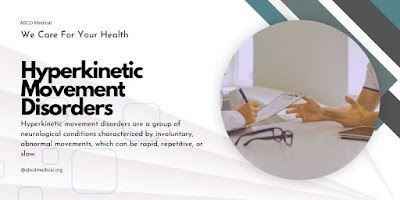What are Hyperkinetic Movement Disorders?
Hyperkinetic movement disorders are a diverse group of neurological conditions characterized by excessive, involuntary, and often unpredictable movements. Unlike hypokinetic disorders (such as Parkinson’s disease), which are marked by slowness and reduced movement, hyperkinetic disorders result in too much movement, often disrupting voluntary motor activity and daily function. These disorders can vary greatly in presentation, underlying pathology, and impact, making them a complex and fascinating area within neurology.
Table of Contents
Definition of Hyperkinetic Movement Disorders
Hyperkinetic movements are involuntary, meaning they are not under conscious control. They can be rhythmic or arrhythmic, sustained or brief, and may affect different muscle groups, including those in the face, limbs, or trunk. The abnormal movements may occur at rest or during voluntary action, and they often worsen with emotional stress and disappear during sleep.
Types of Hyperkinetic Movement Disorders
Several clinically distinct types of hyperkinetic movement disorders have been identified, each with unique characteristics:
1. Chorea
Chorea consists of rapid, irregular, purposeless movements that seem to flow randomly from one body part to another. Classic examples include Huntington’s disease, an inherited neurodegenerative disorder, and Sydenham’s chorea, which can follow streptococcal infections in children.
Examples of Chorea
➧ Huntington’s disease – A hereditary neurodegenerative disorder marked by progressive chorea, cognitive decline, and psychiatric symptoms.
➧ Sydenham’s chorea – Occurs after streptococcal infections; typically affects children.
➧ Chorea gravidarum – Chorea occurring during pregnancy, often related to hormonal changes in women with a history of rheumatic fever.
➧ Lupus chorea – Chorea associated with systemic lupus erythematosus (SLE).
➧ Drug-induced chorea – Caused by levodopa, antipsychotics, or anticonvulsants.
2. Dystonia
Dystonia is characterized by sustained or intermittent muscle contractions causing twisting, repetitive movements, or abnormal postures. It can affect a single body region (focal dystonia), multiple regions (segmental dystonia), or the whole body (generalized dystonia). Examples include cervical dystonia (neck muscles) and writer’s cramp.
Examples of Dystonia
➧ Primary dystonia (e.g., DYT1 dystonia) – Often presents in childhood or adolescence; may start in one limb and spread.
➧ Cervical dystonia (spasmodic torticollis) – Abnormal neck postures and movements.
➧ Blepharospasm – Involuntary eyelid closure.
➧ Writer’s cramp / task-specific dystonia – Appears during specific tasks.
➧ Secondary dystonia – Due to stroke, cerebral palsy, Wilson’s disease, or certain drugs.
3. Myoclonus
Myoclonus involves sudden, brief, shock-like jerks of a muscle or group of muscles. These can be physiological (such as sleep starts) or pathological, occurring in metabolic disorders, epilepsy, or neurodegenerative diseases.
Examples of Myoclonus
➧ Juvenile myoclonic epilepsy – Characterized by brief jerks, usually of the arms.
➧ Cortical myoclonus – Seen in some epileptic syndromes.
➧ Post-hypoxic myoclonus (Lance–Adams syndrome) – After brain hypoxia.
➧ Metabolic or drug-induced myoclonus – Due to renal or hepatic failure, or medications.
4. Tics
Tics are sudden, repetitive, stereotyped movements or vocalizations. They are characteristic of Tourette syndrome, which often presents in childhood and may include both motor and vocal tics.
Examples of Tics
➧ Tourette syndrome – Characterized by multiple motor and at least one vocal tic, usually beginning in childhood.
➧ Transient tic disorder – Tics lasting less than one year, common in children.
5. Tremor
Tremor is an involuntary, rhythmic oscillation of a body part. While some tremors (like the resting tremor of Parkinson’s disease) are associated with hypokinetic disorders, others, such as essential tremor, belong to the hyperkinetic spectrum.
Examples of Tremor Found in Hyperkinetic Movement Disorders
➧ Essential tremor – The most common movement disorder; affects hands, head, and voice.
➧ Dystonic tremor – Occurs in the body parts affected by dystonia.
➧ Cerebellar tremor – Associated with lesions of the cerebellum.
6. Ballism
Ballism is a severe, flinging type of chorea involving large-amplitude movements, usually affecting one side of the body (hemiballismus). It often results from lesions in the subthalamic nucleus of the brain.
7. Athetosis
Athetosis involves slow, writhing, continuous movements, often affecting the hands and feet. It is commonly seen in cerebral palsy resulting from perinatal brain injury.
8. Other mixed or secondary hyperkinetic disorders
Wilson’s disease – Copper metabolism disorder; can cause a mix of tremor, dystonia, chorea, and dysarthria.
Tardive dyskinesia – Involuntary movements of the mouth, tongue, or limbs, usually caused by long-term antipsychotic use.
Causes and Pathophysiology
Hyperkinetic movement disorders can be caused by a variety of factors, including:
➧ Genetic mutations (e.g., Huntington’s disease, Wilson’s disease)
➧ Autoimmune reactions (e.g., Sydenham’s chorea)
➧ Metabolic disorders (e.g., hepatic encephalopathy)
➧ Drug-induced causes (e.g., tardive dyskinesia from long-term antipsychotic use)
➧ Structural brain lesions (e.g., stroke, tumors affecting the basal ganglia)
The underlying pathophysiology often involves dysfunction in the basal ganglia, a group of interconnected nuclei in the brain critical for regulating movement. Hyperkinetic disorders generally result from reduced inhibitory output from the basal ganglia to the thalamus, leading to excessive motor cortex excitation and uncontrolled movement.
Clinical Evaluation of Hyperkinetic Movement Disorders
Diagnosing hyperkinetic movement disorders involves:
➧ Detailed clinical history, including age of onset, family history, and medication use.
➧ Neurological examination to characterize the type and distribution of abnormal movements.
➧ Laboratory tests, such as copper studies for Wilson’s disease or genetic tests for Huntington’s disease.
➧ Neuroimaging (MRI or CT) to detect structural lesions.
Treatment and Management of Hyperkinetic Movement Disorders
Treatment depends on the underlying cause and the type of hyperkinetic disorder:
1. Medications: Dopamine-depleting agents (e.g., tetrabenazine) for chorea; anticholinergics or botulinum toxin for dystonia; benzodiazepines or anticonvulsants for myoclonus.
2. Behavioral interventions: Habit reversal therapy for tics.
3. Surgical options: Deep brain stimulation (DBS) targeting the globus pallidus or subthalamic nucleus for severe dystonia or refractory tremor.
4. Treating underlying conditions: Antibiotics for Sydenham’s chorea or copper chelation for Wilson’s disease.
Management often requires a multidisciplinary approach, including neurologists, psychiatrists, physiotherapists, and occupational therapists.
Hyperkinetic movement disorders encompass a complex and varied group of conditions marked by excessive, involuntary movements. While their causes and clinical presentations differ, they share common neural circuitry disruptions centered on the basal ganglia.



